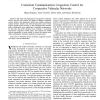Free Online Productivity Tools
i2Speak
i2Symbol
i2OCR
iTex2Img
iWeb2Print
iWeb2Shot
i2Type
iPdf2Split
iPdf2Merge
i2Bopomofo
i2Arabic
i2Style
i2Image
i2PDF
iLatex2Rtf
Sci2ools
TWC
2011
2011
Contextual Communications Congestion Control for Cooperative Vehicular Networks
—The wide scale deployment of cooperative vehicular ad-hoc networks will require the design of efficient congestion control policies that guarantee stable and reliable communications between vehicles and with infrastructure nodes. These policies should reduce the load on the communications channel, while satisfying the strict application’s reliability requirements. To this aim, this letter proposes and evaluates a contextual cooperative congestion control policy that exploits the traffic context information of each vehicle to reduce the channel load, while satisfying the vehicular applications requirements.
| Added | 15 May 2011 |
| Updated | 15 May 2011 |
| Type | Journal |
| Year | 2011 |
| Where | TWC |
| Authors | Miguel Sepulcre, Javier Gozálvez, Jérôme Härri, Hannes Hartenstein |
Comments (0)

